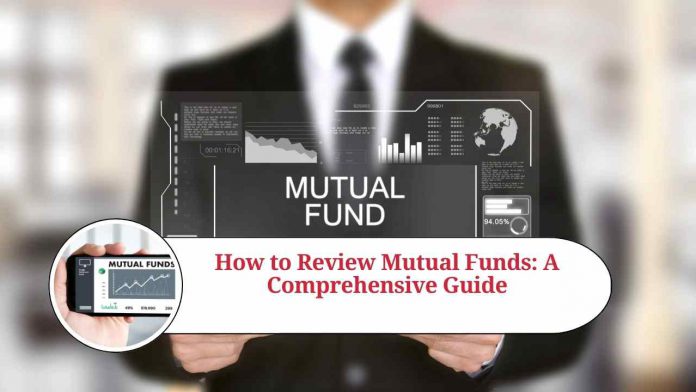Mutual funds are one of the most popular investment vehicles for individual investors. They provide diversification and professional management, making them a great option for those looking to grow their wealth over the long-term. However, with so many mutual funds available, it can be challenging to choose the right one for your needs. In this blog post, we’ll discuss how to review mutual funds and find the best one for you.
Define Your Investment Goals
Before you start reviewing mutual funds, it’s essential to define your investment goals. Ask yourself what you’re trying to achieve with your investments. Do you want to generate income, grow your wealth, or both? Are you investing for the short-term or the long-term? Once you’ve established your investment goals, you can start to narrow down your mutual fund options.
Review the Fund’s Performance
One of the most critical factors to consider when reviewing mutual funds is their performance. You’ll want to review the fund’s returns over the past several years to determine how it has performed in various market conditions. Look for funds that have consistently outperformed their benchmark and have a track record of delivering strong returns over the long-term.
Analyze the Fund’s Fees and Expenses
Mutual funds charge fees and expenses that can eat into your returns over time. It’s essential to review these costs and ensure they’re reasonable. Look for funds with low expense ratios, as these fees can significantly impact your returns over the long-term. Also, be sure to review any additional fees, such as sales loads or transaction fees.
Evaluate the Fund’s Risk
All mutual funds come with a certain level of risk. Some funds are riskier than others, depending on the investments they hold. When reviewing mutual funds, it’s crucial to evaluate the fund’s risk and ensure it aligns with your risk tolerance. Look for funds that offer a level of risk that you’re comfortable with and that matches your investment goals.
Consider the Fund Manager’s Experience
The fund manager’s experience is another critical factor to consider when reviewing mutual funds. Look for managers with a track record of success and experience managing funds similar to the one you’re considering. A seasoned manager can make a significant difference in a fund’s performance over the long-term.
Review the Fund’s Holdings
Finally, review the fund’s holdings to determine if it aligns with your investment goals and risk tolerance. Look for funds with holdings that are diversified across various sectors and industries. This diversification can help reduce risk and provide exposure to different areas of the market.
Conclusion
Reviewing mutual funds can be a daunting task, but it’s essential to find the right one for your needs. By considering the factors outlined above, you can narrow down your options and find a fund that aligns with your investment goals and risk tolerance. Remember to review the fund’s performance, fees and expenses, risk, manager’s experience, and holdings before making a decision. With a little research, you can find the right mutual fund and start building wealth for the long-term.
Read more useful content:
- How to invest in mutual funds
- All about mutual funds-types & importance
- The Power of SIP Investment in Mutual Funds
Frequently Asked Questions (FAQs)
Q: What is a mutual fund?
A: A mutual fund is a type of investment vehicle that pools money from multiple investors to purchase a diversified portfolio of stocks, bonds, or other securities.
Q: Why should I review mutual funds?
A: Reviewing mutual funds is essential to ensure that you’re investing in a fund that aligns with your investment goals and risk tolerance. It also helps to ensure that you’re investing in a fund with a track record of success and reasonable fees and expenses.
Q: What factors should I consider when reviewing mutual funds?
A: When reviewing mutual funds, you should consider factors such as the fund’s performance, fees and expenses, risk, manager’s experience, and holdings.
Q: How can I evaluate a mutual fund’s performance?
A: To evaluate a mutual fund’s performance, review its returns over the past several years and compare them to its benchmark. Look for funds that have consistently outperformed their benchmark and have a track record of delivering strong returns over the long-term.
Q: What fees and expenses should I look for when reviewing mutual funds?
A: When reviewing mutual funds, look for funds with low expense ratios, as these fees can significantly impact your returns over the long-term. Also, review any additional fees, such as sales loads or transaction fees.
Q: How can I determine a mutual fund’s risk level?
A: Mutual funds come with a certain level of risk. To determine a mutual fund’s risk level, review its holdings and evaluate the types of securities it invests in. Look for funds that offer a level of risk that you’re comfortable with and that matches your investment goals.
Q: Why is a fund manager’s experience important when reviewing mutual funds?
A: A fund manager’s experience is essential when reviewing mutual funds because it can significantly impact the fund’s performance over the long-term. Look for managers with a track record of success and experience managing funds similar to the one you’re considering.
Q: What should I look for when reviewing a mutual fund’s holdings?
A: When reviewing a mutual fund’s holdings, look for funds with holdings that are diversified across various sectors and industries. This diversification can help reduce risk and provide exposure to different areas of the market.




















